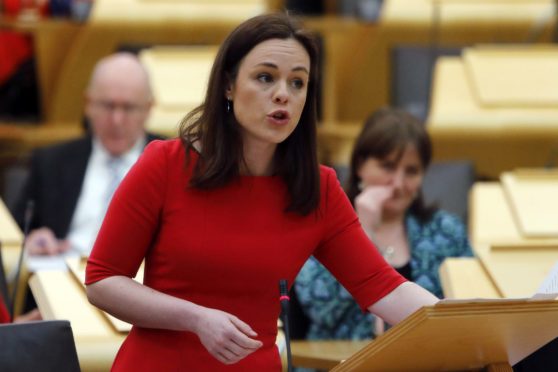
Extra cash to tackle the climate emergency and reduce greenhouse gas emissions has been announced in the Scottish Government’s new budget.
Public Finance Minister Kate Forbes unveiled the tax and spending plans for 2020-21 in place of Derek Mackay, who was forced to quit as finance secretary after it emerged he had sent hundreds of messages to a teenage boy.
While Mr Mackay’s sudden resignation – and subsequent suspension from the SNP – dominated proceedings at Holyrood, the Scottish Government pressed ahead with its budget.
Ms Forbes, the first woman to announce a budget in the Scottish Parliament, promised Police Scotland would get the “money they require to maintain officer numbers at current levels”.
Very proud of this @scotgov budget. Against a backdrop of Brexit & Tory austerity, we’re investing strongly in the economy, public services & tackling the climate crisis. I am also v proud of @KateForbesMSP who has stepped up in tough circumstances and shown what a talent she is.
— Nicola Sturgeon (@NicolaSturgeon) February 6, 2020
With Scotland having recorded its highest number of drugs deaths in 2018 at 1,187, she said there would be a rise of almost 60% in funding to tackle the harm caused by drugs and alcohol.
The budget provided for record spending of £15 billion in health and care services, with £645 million of cash going towards expanding the provision of free nursery care for youngsters
With governments across the world taking action against climate change, many of the announcements were focused on that.
Ms Forbes said: “We promised this would be a budget that steps up the delivery of our ambition to tackle climate change.
“Today we deliver on that.”
The minister announced £1.8 billion of capital spending would go on specific projects aimed at cutting emissions.
To encourage more Scots to use public transport, she said funding for rail and bus services would rise by £286 million to £1.55 billion in 2020-21.
In addition, more than £85 million will be spent promoting active travel – such as walking and cycling – while a loan fund that helps people make the switch from petrol and diesel to low-emission vehicles is being upped to £35 million.
Spending on forestry is be increased to more than £64 million after expert advisers at the Committee on Climate Change highlighted the need to increase tree planting levels.
The Scottish Government also pledged £2 billion of “transformational infrastructure investment” in measures aimed at tackling climate change in the next parliamentary term – with Ms Forbes saying ministers would “prioritise multi-year investment in low carbon measures at the scale required to help tackle the climate change emergency”.
She confirmed there would no increase in the rates of income tax Scots pay next year.
While the threshold at which workers are required to pay the higher and top rates of income tax has been frozen, the amount at which people start to pay the basic and intermediate rates will rise in line with inflation.
Overall, 56% of Scottish taxpayers will pay less than they would if they lived elsewhere in the UK, Ms Forbes said.
Ministers will provide £21 million to fund the new Scottish Child Payment – a £10 a week grant aimed at helping poorer families, which is being brought in later this year.
Overall, Ms Forbes said ministers would spend no less that £1.4 billion next year in helping low-income households.
She told MSPs the budget “delivers for our public services, invests in the path to net-zero emissions, boosts our economy and through the new child payment delivers a game changer in the fight against poverty”.

Enjoy the convenience of having The Sunday Post delivered as a digital ePaper straight to your smartphone, tablet or computer.
Subscribe for only £5.49 a month and enjoy all the benefits of the printed paper as a digital replica.
Subscribe